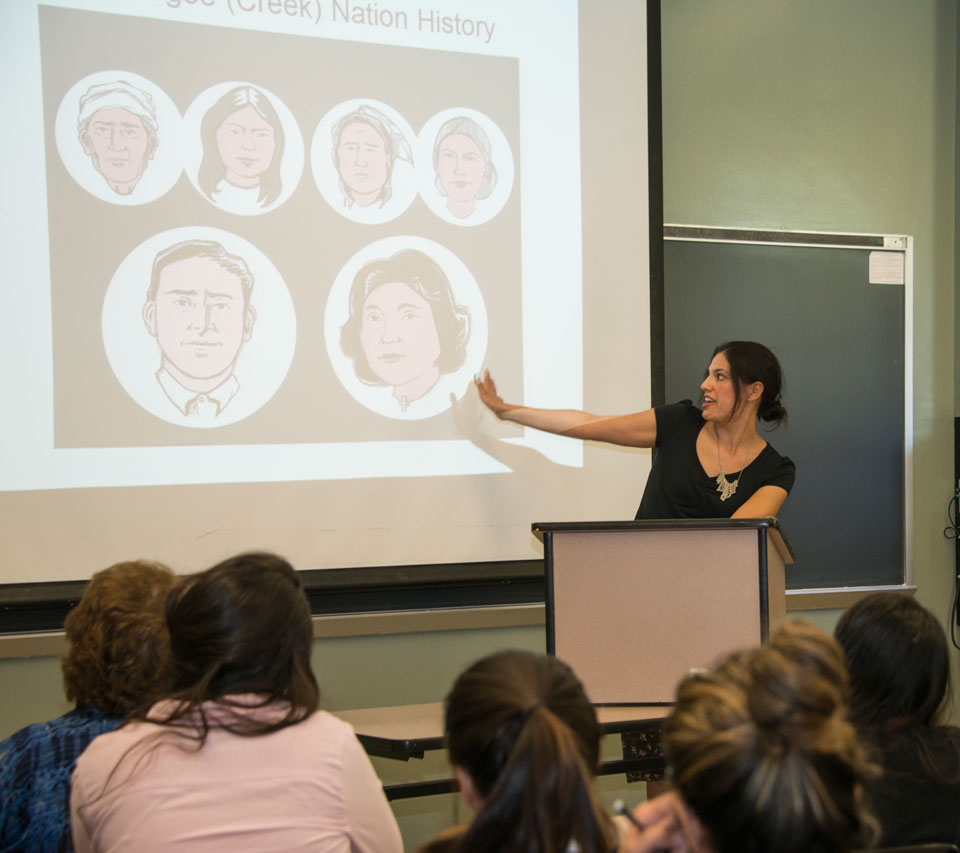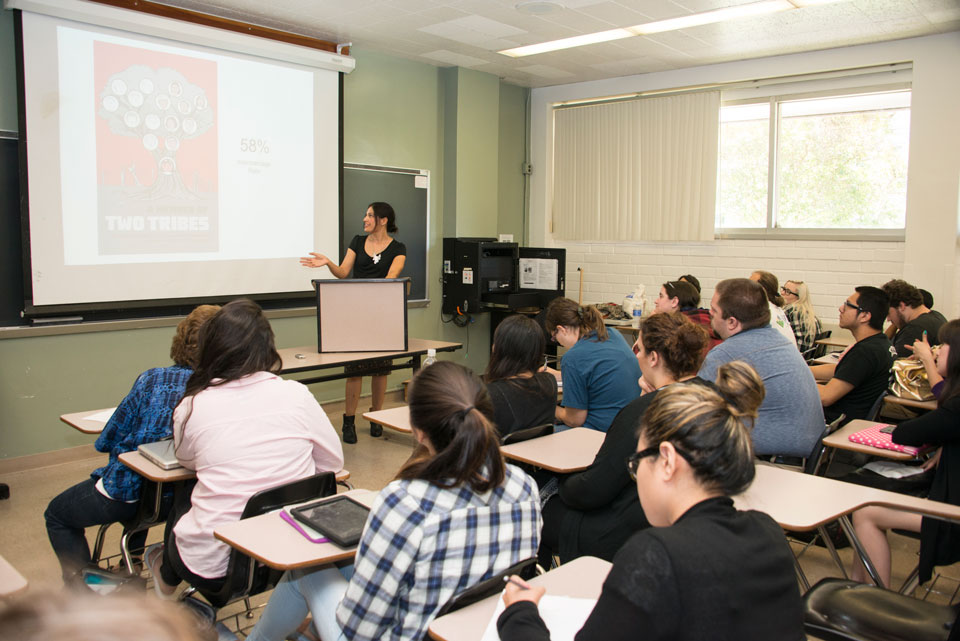“Member of Two Tribes” Explains Her Incredible Journey in CSUN Class

Emily Bowen Cohen, a graphic novelist working on a comic book about her Jewish and Native American roots, spoke as guest lecturer in Beth Cohen’s religious studies class, April 28, 2015, in Sierra Hall. Photo by Lee Choo.
For Hanukkah, Emily Bowen Cohen learned to make Indian fry bread. Thanks to a little (or maybe a lot of) vegetable and canola oil, the Los Angeles-based artist has incorporated the beloved Native American staple into her annual winter celebration of the Jewish festival of lights, when it’s traditional to eat foods fried in oil.
Bowen Cohen is, as young American Jews affectionately call each other, a “member of the tribe.” She is also a member of the Muscogee (Creek) Nation, which traces its roots to what is now Georgia and Alabama but was forced to travel along the Trail of Tears to “Indian territory” in Oklahoma.
“I decided that if I was going to be all the way Jewish, I had to be all the way Indian too,” said Bowen Cohen, who lives in the traditional Jewish neighborhood of Pico-Robertson.
She gave a guest lecture, “Member of Two Tribes: the Real Life Story of a Jewish Native American,” on April 28 to students, faculty members and guests at California State University, Northridge. She spoke to professor Beth Cohen’s RS 378 religious studies class, “American Jewish Experience,” in Sierra Hall on the campus. Bowen Cohen is the CSUN professor’s daughter-in-law and a Harvard-educated graphic novelist. She is working on a comic book about her dual identity — and gave CSUN students a sneak peek.
The faculty members and students — a diverse mix from majors including religious studies, modern Jewish studies and American Indian studies, as well as guests from the surrounding community — sat riveted as Bowen Cohen gave a an account of her journey, accompanied by PowerPoint slides showing her comic-book panels.
“This course is called ‘American Jewish Experience,’” she said. “I’m Native American and Jewish, which is unusual … It occurred to me that I might represent the future of the American Jewish community.”
The artist grew up in the small city of Okemah, Okla. — “the heart of the Indian community” — with her Jewish mother (a New Jersey native) and Muscogee father, a doctor at the area’s only hospital. The couple had met in Boston while he was attending Harvard Medical School, which “was trying to diversify its student population” at the time, Bowen Cohen explained.
She noted that her maternal grandmother, an Ashkenazi Jew, told her children, “True love matters over all else!” and supported her daughter’s desire to marry for love — outside of the Jewish community.
After earning his medical degree, Bowen Cohen’s father wanted to return to his native Oklahoma to do some good for his own tribe, she said. The family relocated to Okemah, where they raised Bowen Cohen, her twin sister and an older sister.
“We lived in a town with one stoplight,” a city of about 5,000 people, the artist said. She was particularly close to her father’s mother, “Mommom Mary,” who lived nearby and kept tabs on her granddaughters’ experiences in public school.
“She wanted to make sure I knew who was part of my tribe. In Oklahoma, surrounded by so many Native Americans, it’s really easy to be part of the Indian community. But — it’s much harder to be Jewish.”
In Oklahoma in the 1980s, the lines between church and state were “fuzzy,” she said. “Our part of Oklahoma was smack in the middle of the Bible Belt.” After a few uncomfortable experiences for her Jewish children in public school, Bowen Cohen recalled, her mother was “called to action.” So, off they went to a synagogue in Tulsa (the big city, about a 90-minute car ride away), so I could go to Sunday school.”
At Hebrew school in a Reform congregation, “I was Jewish, but I was different.” Her skin was darker. In those elementary-school years, Bowen Cohen’s white, Jewish peers teased her for her skin tone and small-town clothes.
Sadly, soon after, her journey took an unexpected turn.
Six months after her oldest sister’s bat mitzvah in 1984 in Tulsa, her father passed away. The family relocated back to New Jersey and moved in with her mother’s parents.
“Then, Mommom Mary passed away, and we lost all contact with my father’s side of the family. I lost my Native American community.”
After coming of age in diverse, metropolitan New Jersey — bat mitzvahed herself and living a typical, suburban American teen life — Bowen Cohen grew up, attended and graduated from Harvard herself and married “a nice Jewish boy,” she said.
Fast-forward to the 2000s, when the couple moved to Pico-Robertson, into the Orthodox community and became parents of three children.
Even though it made people in her new community uncomfortable to hear about her parents’ interfaith marriage, it became too painful to sustain her “passing” as a Jewish girl “from New Jersey,” and not proclaiming her proud, paternal Indian heritage, Bowen Cohen said. “As more people intermarry … there needs to be room for all of the roots — spaces have to be created that allow people to be both sides of themselves wholly, without question and without raised eyebrows.
“You have to be a really strong person to gather yourself when you’re upset or angry about something and confront someone” who has made disparaging or ignorant remarks, she said. “You have to teach them.”
Becoming a mother, she said, was a watershed moment.
“I was trying on my own to teach my children about being Native American. It wasn’t authentic. That’s why we went back to Oklahoma,” to reconnect with her father’s family.
In just the past few years, Bowen Cohen started obsessively researching her father’s family tree (“Facebook was really helpful!”), trying to track them down in the Okemah area and across Oklahoma.
Happily, she found them — and they were thrilled to welcome back Bowen Cohen, her husband and their three kids. She is enrolled in the Muscogee nation (the name preferred by the Muscogee tribe, as Creek is the U.S. government term, she said). Her father was not at all religious, but his extended relatives are practicing Baptists, and continue to practice traditional Indian rituals.
“We always went to powwows with my family — even after my father died, my mom would take us — and I still bring my children to powwows,” she said. She also noted that her husband is incredibly supportive of her ongoing quest. “I could not have gone back to Oklahoma without his support.”
The CSUN students and guests peppered Bowen Cohen with questions. Many wanted to hear her opinions on Indian tribal politics, as well as the judgmental attitudes she encountered in Pico-Robertson’s traditional Jewish community. She attributed the discomfort of her Orthodox neighbors to the intense fear that intermarriage “might mean a watering down” of Judaism in America, and around the world.
“(American Jews) are really worried — they care a lot of being Jewish, and they really don’t want to see it getting watered down and disappear.”
Bowen Cohen, however, offered the class a message not of worry, but of hope. She has become active with the LA group Jews of Color/Jewish Multiracial Network, where she learned to share her love of fry bread — a traditional food at powwows — with her observance of Hanukkah.
Her comic book is in progress, but Bowen Cohen recently sold a “minicomic” at Comic-Con in San Diego. To view her comics and learn more about her art and experience, visit her shop on Etsy.com, memberoftwotribes.


 experience
experience